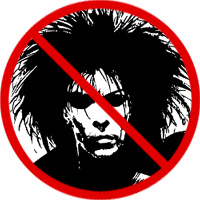
The Discreet Charm of the Bourgeoisie
Jean-Claude Carrière and Luis Buñuel, 1972
#9 (chronologically) in Mike D'Angelo's list of twelve films
to which he would give a score of 100 out of 100.

|
|
|
|
Premise
Over the course of several days half a dozen people attempt to have a
meal together but something always goes wrong: they've shown up at their
hosts' house a day early, the restaurant owner has died, there are loud
military exercises outside, etc.
Reaction
Quit after about an hour. This is a dream-logic—
Wait, that's what I said about the last one of
these. Hmmm! Looks like we've got a new pattern.
Roger Ebert says, in a rave review of this film, that Buñuel
"is amusing himself," feeling "free at last to indulge his fancies" and
"liberated from any commercial or narrative requirement." I agree!
Except I would tweak Ebert's phrasing ever so slightly:
| original: | replace with: |
|---|
| "is amusing himself" | "is wanking" |
| "free at last to indulge his fancies" | "self-indulgent" |
| "liberated from any commercial or narrative requirement" |
"fails to meet narrative requirements" |
There's no reason to keep watching a movie if you don't want to
know what comes next. Now, one reason you might want to keep
watching is that the movie is so beautiful or so funny or has
such an attractive performer in it that you keep watching just
to gaze at the next landscape or laugh at the next joke or leer
at the attractive performer some more. Maybe you care about the
characters so much that you want to know what happens to them
just out of general interest. But most often, you watch because
you're at least somewhat interested in the plot.
So, what's the plot of this one? Let's check out the
IMDb
plot summary page. Ah, here we go. "A complex, shifting,
virtually plotless web of dreams within dreams within dreams."
Uh-huh. Also, the characters were annoying, it wasn't much
to look at, I didn't find it funny, and none of the performers
did much for me. So plotlessness is a problem.
As is the dreaminess. Off the top of my head, I can think of
three main problems with modeling movies after dreams:
- Dreams are personal. A couple of nights ago I dreamed that
I was talking to my best friend from high school, whom I haven't seen
in ten years. To me this was a powerful dream, because I miss her a
lot. Interest to you: zero. In Discreet Charm, there's a bit
in which a soldier relates a dream about being in an abandoned city.
And he sees a friend who's long dead, and he sees his mother, and he
goes into the a building, and it's full of cobwebs, and he comes back
out, and she isn't there anymore, and I don't care. Nothing in
that situation is intrinsically interesting. It would be tiresome
coming from someone I cared about; coming from some random it was death.
- Dreams are internal. Dreams in movies and comics and TV
always feel fake to me, because these are visual media, and dreams are
not about things you can see. At least, mine aren't, not usually. Most
of my dreams are heavily predicated on knowledge. "It didn't
look like my house, but I knew it was my house." "And then suddenly I
knew that the city had been destroyed, so I didn't go there." Viewing
the events of a dream on a screen is like watching someone listening to
a song on headphones. You're missing the most important information.
- Dreams are plotless. As EM Forster famously noted, to
turn "the king died and then the queen died" into a plot, you need to
add "of grief" — that is, turn the first part into a cause and
the second into an effect. But the defining trait of dream logic is
that it eschews the chains of cause and effect that make the world
coherent. In dreams, you just suddenly know things, for no reason;
the world is suddenly different, for no reason; you undertake actions
for no reason, because they just seem like the thing to do.
Now, some say that modern physics has shown that cause and effect are
really just neurological illusions and that dream logic is actually how
the universe truly operates. But (a) those people are usually high and
(b) even if this is true, I still see the role of the artist, at least
of any artist I'd be interested in, as bringing order to the chaos.
And so:
New pattern
| 29 |
Storytelling is about communication, but dreams tend to be meaningful
only to the dreamer; film is a visual medium, but dreams tend to be
a tissue of internal states that can't be seen; narrative is a web
of causality, but in dreams the links between cause and effect are
tenuous at best. Therefore dream logic is the enemy of narrative
and should be avoided, particularly in movies.
|

Return to the Calendar page!
|


